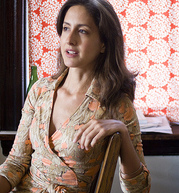At exactly 11 o'clock on a Thursday morning in December, I pick up the phone to call Xan Aranda. I'm nervous, not because I'm afraid the conversation will be awkward, exactly, but because of my general telephone phobia. In this age of ubiquitous asynchronous communication, I'm hardly the only person who prefers email or texting, but my aversion to the phone more than three decades old, and was perhaps exacerbated by the two years I spent knocking on doors as a missionary for the Church of Jesus Christ of Latter-day Saints.
That Mormon connection is, in fact, what has led to this call. Xan Aranda is a filmmaker, most recently the director of Andrew Bird: Fever Year, which has been doing brisk business on the festival circuit over the past year. A few months ago I ran across a Kickstarter campaign to fund the completion of her latest project, Mormon Movie, a very personal documentary about faith communities and why we stay in them or leave them. Her ten-minute sample reel from the work-in-progress was good enough to shake my wallet wide open. I contributed enough to her Kickstarter, in fact, to claim one of the primo perks—thirty minutes on the phone to pump her about the movie or related topics.Aranda picks up. Her engaging, intelligent manner puts me at ease even as we exchange pleasantries. I've come armed with a list of questions my wife and I put together last night, but before I can launch into them Aranda heads me off at the pass, cutting right to the theme of her film.
"First off," she says, "you mentioned in your email that you're a former Mormon too. I'm curious to know how you came to leave the Church."
I try to keep my answer brief, not wanting our half-hour to be all about me. "I guess I was four or five when I first started questioning the Church," I say. "My dad was strict even by Mormon standards, and I learned pretty early that my doubts weren't safe to talk about. I went on my mission at nineteen, not because I wanted to but because that's what I was expected to do."
"Where did you serve?" asks Aranda.
"Alberta, Canada. Which is a whole different story. I wasn't the most diligent missionary, though, and after my two years were up I just gradually stopped going to church. When I was 28, I moved to New York City, and finding myself suddenly outside of that Mormon-rich Utah environment made me realize I'd actually left the Church quite some time earlier."
"How did your family take that?"
"Not well. I didn't talk to them for a couple of years. But that was my fault, really, because of how angry I was with the Church. We've mostly gotten past that. I'm the oldest of eight, and it helps that three of my siblings have left the Church too." Time to shift the focus. "How about you?"
"I'm the sixth [CHECK] of seven kids myself," Aranda says, "and only one of us stayed in the Church. That's hard for my parents, but they also were always supportive of us making up our own minds."
"That seems unusual," I say.
"We didn't grow up in the same kind of environment," says Aranda. "We lived in the suburbs of Chicago until I was seventeen. After we moved to Arizona [New Mexico? CHECK], I remember thinking I might want to go on a mission myself, and talking to my mother about it. You have to understand, she's a real scriptorian. She taught seminary for twenty years. But when I told her about this desire I had to help people, to do what I could to make their lives better, she told me that instead of a mission it sounded more like I might belong in the Peace Corps."
From the Mormon Movie sample reel, I already know a little about Aranda's mother. In the early '60s, Dana Rosado was a student at Brigham Young University, where she starred in Summer of Decision and And Should We Die, two films produced by the Church's Department of Education at its busy Motion Picture Studio. Typical MPS productions were hokey cautionary tales meant to scare Mormon youths into walking the straight and narrow. Dana might have gone on to New York or Hollywood to pursue acting after college, but in a decision worthy of one of her roles she opted for marriage and a family instead.
I happened to have seen Dana's work growing up, without ever knowing her name. Summer of Decision was a film we were shown more than once in seminary, the Church's highly structured para-educational system for high school students. Living in Utah gave me the privilege of spending one class period per day in a lovely little school across the street from my high school, subjected to a rigorous curriculum of religious study. (Had I lived in a state without this "released time" provision, or where the LDS population was less dense, I'd have had to attend these classes in the early morning, before school.) I find it mind-blowing now to imagine a teacher like the ones I had as a teenager in seminary directing anyone away from missionary service.
"I know what interests me in a film like Mormon Movie," I say, getting back to my script. "But who do you see as its audience? Who are you trying or hoping to reach?"
"It's been very interesting to watch who's responded to the Kickstarter," Aranda says. "The whole process of the campaign was about managing expectations and appetites for what the movie is going to be. A lot of people might have been interested in it because of Mitt Romney, but I want it to be more timeless than that. It's not just about people who've left Mormonism, but people who've left other faith communities as well. It opens broader questions about the experience of being part of something and then feeling compelled to get outside it."
"So Mormonism and your family's experiences are more of a jumping-off point for a larger discussion?"
"Right. This isn't a support-group movie for people who've left, and it's not meant as an indictment of the Church. If it's anything, it's more of a lost-world movie, exploring what you give up when you leave a community."
One of those people who has left his community in some ways while staying a part of a larger community is Aranda's father, Mario. He grew up in the Mormon-settled colonies of Chihuahua in northern Mexico, a descendant of polygamists dispatched south by Church leaders during the 1880s, a time when plural marriage was becoming increasingly difficult to practice in the United States and its territories. Mario set his back to the colonies when he left for college at BYU, and he hasn't really been back since, though he remains a faithful Latter-day Saint [CHECK].
Perhaps not coincidentally, the other Church movie in which Aranda's mother Dana appeared was And Should We Die, a "historical" drama about the bloody clash between those Mormon colonists and Pancho Villa during the Mexican Revolution. In reality, Villa was a friend to the colonists, most of whom supported the Revolution. The LDS Church, though, has never been an institution known for letting history get in the way of a good story.
"So polygamy's going to have to come up in your film," I say. "Do you think you'll be touching on any other controversial aspects of the Church? Anything you feel might be sensitive or might touch a nerve with members?"
"There's a lot misinformation and distortion out there in the media already," Aranda says. "That's despite all the attention the Church has gotten over the past couple of years. I just want to do a good job of reflecting actual Mormon beliefs, in a way that an average Church member would recognize as accurate and fair."
"I know exactly what you mean," I say. "Back in the nineties, I did a lot of writing on the web about my experiences leaving the church. Sometimes I'd run across these fundamentalist Christian hate sites that were linking to my stuff, trying to use it as proof that Mormons really were Satanists or whatever. I'd get pretty bent out of shape."
Which is perhaps a strange sentiment coming from the jerk who added the Mormon temple film to the Internet Movie Database back in 1996, but there you go.
"You mentioned in email that you're working on a memoir of your missionary experiences," Aranda says. "There was something about getting arrested in Canada...?"
I clear my throat. "That's something that takes a full book to properly explain, but here's the short version. You know how important it is in Mormon culture that every young man serves a mission for two years. Well, about six months into mine I had a companion who was trying to run away. He had a flight booked, and I ended up at the airport trying to talk him out of it. He was listening, though, and it had been drilled into my head that you're supposed to do everything in your power to keep your companion from leaving in a situation like this. So my last-ditch effort was to call in a bomb threat.""Oh, my. That was extreme," Aranda says. "Did it work?"
"No," I say, "he went home anyway. And I went to jail. Only for a day, true. It could have been a lot worse."
"Did that contribute to your leaving the Church?"
"Partly, sure. I mean, at the time I think I was trying to convince myself and everybody else that I was faithful enough to be a missionary. I overcompensated, trying to prove I really belonged in that community, when I didn't."
The conversation continues, ranging across topics from parental disappointment with our unconventional life choices to the lack of artistic role models in the Church, from the place of dramatic cinema in Mormon culture to the question of whether Mormon Movie will end up requiring any Church cooperation. One of the pleasures of talking with another former Mormon is the wealth of shared vocabulary and cultural references that you don't need to pause to explain. We're discussing the term "apostasy" when the one-hour mark slides past.
"I wish there were a better word than that for leaving the Church," Aranda says, "one that didn't have so much negative baggage. I guess we just have to call it 'leaving the Church.'"
Fortunately she won't be leaving Mormon Movie unfinished. The Kickstarter campaign exceeded its $25,000 goal, and production will continue throughout the year [CHECK]. More fundraisers are planned, including at The Hideout on Saturday, February 2, where the third annual "They Shoot Indies, Don't They?" dance derby spectacular benefits Mormon Movie. Find info and tickets at: http://www.hideoutchicago.com/event/207565
Crossposted from Inhuman Swill



